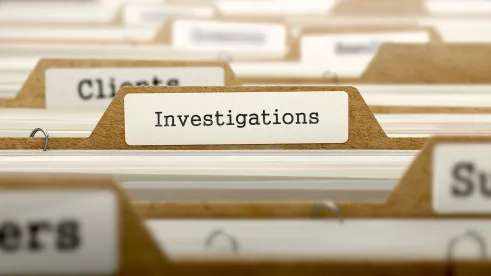A company that is the subject of a U.S. government investigation under the Foreign Corrupt Practices Act (FCPA) will have significant incentives to cooperate with the U.S. Justice Department and, if applicable, the U.S. Securities and Exchange Commission (SEC), to avoid the potential of a huge fine. Recently, a senior official in the Biden Administration’s Justice Department indicated that the Department would take a more aggressive position on requiring companies to identify individuals involved in a matter under investigation by the Department.[1] As part of any cooperation with the government, the Company will be required to provide information to the government about any individual whose conduct may be relevant to the investigation. If you are a company executive or employee whose conduct is the subject of an FCPA investigation, here are eight tips to remember.
The company’s counsel is not your lawyer. The company’s lawyers will be the first to admit they only represent the company, but they will also ask you to cooperate with them in an interview, the substance of which the company may disclose to the government. You have a right to consult with your own counsel before agreeing to such an interview (even if the company has not retained counsel for you), and to stop the interview at any time if you believe your conduct is a significant issue in the investigation. If the company demands your cooperation, you should review your employment agreement to see if it requires your cooperation.
Ask for separate counsel. If you believe that your conduct could become the focus of an investigation, ask the Company for separate counsel. You have a right to be involved in the selection of your counsel. After all, this person may ultimately represent you before the government in decisions that could be life-impacting, to say the least.
Be mindful of theories developed by investigators. The government’s investigators may interpret documents differently than you would, and they will form their understanding of events with the benefit of hindsight and visibility into the role of others. Company counsel will also view the documents through a prosecutor’s lens, and that is consistent with their role, which is to provide the company’s management with a frank assessment of exposure the company may face from available evidence, including the company’s documents. That does not mean, however, that the government’s interpretation is the correct one. Moreover, you may have an understanding of the circumstances surrounding an email, memorandum or piece of correspondence that may not be easily appreciated in the distilled hindsight of an internal investigation. If asked about a document, be sure the investigator appreciates your understanding of circumstances that inform your interpretation of the document.
Watch for cultural bias. In FCPA cases, cultural bias, unfortunately, may be a factor in how an investigator assesses the credibility of witnesses and subjects who are not fluent English speakers. This could be due to nuances in the witness’ answers that are lost in translation. But this could also be due to a lack of understanding about a non-English speaking culture. This can cause both company and government investigators to fail to inquire fully into other relevant legal and business practices that may mitigate or explain certain conduct. Relatedly, investigators may be inclined to believe self-serving statements of some individuals who are fluent English speakers over non-English proficient witnesses and subjects.
Proffer agreements do not fully protect you. If, in consultation with your counsel, you decide it is in your interest to be interviewed by the government, you should be aware that a proffer agreement only provides you with limited immunity regarding the direct use of your statements against you by the government. The government can still use your proffer for other reasons, including to form leads for other evidence that may expose you to criminal liability. You should be sure to discuss with counsel whether, in light of that, the risks of a sitting down for a proffer with the government are greater than the risks of not cooperating.
Cooperation with foreign law enforcement is risky. If a foreign law enforcement agency is also involved in the investigation, you may be asked by that agency or even U.S. authorities to cooperate with that agency’s investigation. It is risky, however, to cooperate with foreign law enforcement agencies, like the UK’s Serious Fraud Office, that have not agreed to safeguards surrounding the use of your interview similar to those provided by the Justice Department. Those law enforcement agencies can use your statements against you and, if they choose to bring formal charges against you, may avail themselves of formal international legal agreements with the United States to seek your extradition to face charges. Even if a foreign law enforcement agency is not successful in extraditing you from the United States, it can seek to have a red notice issued by Interpol against you, which will make it difficult for you to travel in certain countries, such as in Western Europe, that may detain you on the notice.
Assume your emails and text messages may be read by investigators. Nothing is easier to misinterpret than a private joke or a quick communication among friends or colleagues in an email. But as a subject of an investigation, you need to be mindful that your electronic communications may ultimately be obtained by government investigators.
You have certain rights in your electronic data. If your employer is cooperating with the government, it will be required to turn over your relevant company emails and any company-related text messages in the company’s possession. Whether you must yield company-related data on your personal devices to the company’s counsel is likely subject to the Company’s policies and/or the terms of your employment agreement. If you are an employee based in the European Union, you have certain privacy rights that you may be able to avail yourself of under the EU’s General Data Protection Regulation (GDPR) in connection with your electronic data, including your company emails. You should also understand that the U.S. government may be able to obtain your private emails and SMS text messages from a U.S.-based cellular carrier or email provider through a search warrant. However, you will have an opportunity to challenge that search warrant in any subsequent U.S. judicial proceeding against you.
In conclusion, company employees and executives whose conduct is of interest to investigators in an FCPA investigation have difficult decisions to make regarding their own cooperation with investigators, and they need to calibrate their response mindful of the suggestions above. Decisions made by individuals in the early stages of an investigation can affect the direction of a white collar FCPA prosecution, including potential cooperation with the government or future litigation of criminal charges.
[1] Deputy Attorney General Lisa O. Monaco Gives Keynote Address at ABA's 36th National Institute on White Collar Crime | OPA | Department of Justice (Oct. 28, 2021).




 />i
/>i

